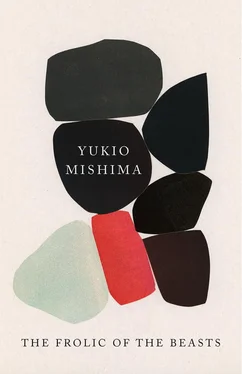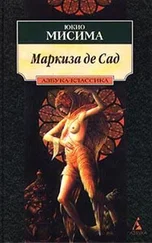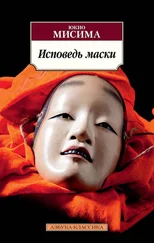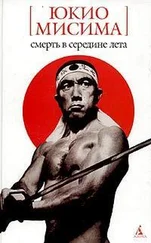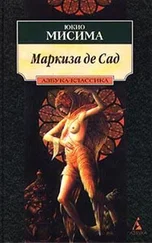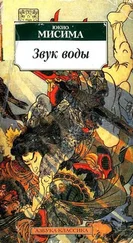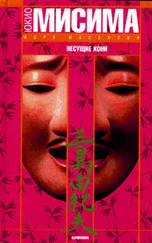—
The color of that sky-blue parasol on the quay was not the color of starvation; it was without a doubt the color of repentance. As for that other kind of starvation—the deprivation of the flesh—that had been sufficiently satisfied the previous night in Numazu, thanks to the money Yūko had entrusted to the prison governor. Kōji was certain that Yūko had also tacitly wished that the money should be used in this manner. Late last night, he had sent for yet another girl. Sensing what he wanted, they were afraid. He woke up in the morning, sandwiched between the two, having been caressed carefully all over, out of a certain sense of fear. In the relentless morning light that came in through the inn curtain, he reached out his hand to touch the object that had continued to exist for so long as a vivid fixation in his mind’s eye. The girls didn’t notice and slept on uncomplaining. It was poor flesh that had been concealed within, the flower of a crepe myrtle, steeped in alcohol, the erosion of the soul for the moment in flesh form, a thing distant and unrelated to the recollections and notions of the prisoners.
—
As Kōji clambered up from the barge, Yūko saw before her a young man, more dauntless than she remembered, and while he was slightly leaner than before, he had lost none of his erstwhile vigor. Wearing a summer suit with an open-collared shirt, he waved a hand cheerfully while clutching a small briefcase in the other.
“You haven’t changed,” Yūko said, greeting Kōji and moving her parasol obliquely to one side. In the shadow it cast, Kōji noticed the dark grape luster of her characteristic thick lipstick.
“I’d like to talk a little before going on to the house,” said Kōji in a slightly hoarse voice.
“Yes, I thought it would be nice to talk, but there are no cafes in the village,” Yūko replied, and scanned the vicinity while describing a lazy arc in the air with the basket she held in one hand. Only two or three of the ship’s passengers disembarked and they moved quickly away from the quay, surrounded by those who had come to meet them. The Ryūgū Maru 20 lost no time in turning its prow and heading off toward the bay entrance, water rippling gently in its wake.
“It’s the opposite direction, but shall we walk toward the bay? There’s a patch of grass and some shady trees where we could talk.”
As they began to walk, Yūko was seized with anxiety that it had been a mistake to take charge of this forlorn young orphan. Since deciding to care for him, she had not once experienced such a sense of trepidation, which was clearly therefore some sort of presentiment. She had even been censured for her rashness by the prison governor, who said he had never before heard of a case where a member of the victim’s family had become the criminal’s guarantor.
The governor appeared at first to believe that it was the result of Yūko’s philanthropic sentimentality, and she eventually conceded as much.
“I believe it is what I ought to do. After all, what he did he did for my sake.”
The governor had looked hard at her as she stood before him in her flamboyant attire. What incorrigible arrogance. This tendency for a woman to want to draw into herself all the complicated origins of the crime is by no means a rare occurrence. She wishes to become the dramatic, aesthetic personification of the origin of the crime itself.
This self-conceit that was on the point of drawing the world to its depths ought, so to speak, to be described as the conception of the spirit; there would be no room for man to interfere in such matters. The governor’s dubious gaze clearly betrayed his thoughts: This woman wishes to conceive everything. She has tried to store it all away in her disagreeably warm belly—everything; even the crime and that prolonged period of remorse; the tragedy, and the cities where men gather together, and even the origin of all mankind’s behavior. Everything…
—
They walked in silence along the bank and gazed at the sea. A thin film of purplish oil lay on the calm surface, and a sundry collection of rubbish—pieces of variously shaped timber, a pair of geta , lightbulbs, food cans, a chipped rice bowl, a corn cob, a single rubber boot, an empty bottle that had once contained cheap whiskey, and, in the middle, the skin of a small watermelon that reflected the flickering color of daybreak in its pale flesh—floated in the water at the very back of the inlet.
Yūko pointed to a small grassy depression in the hillside close to the dolphin memorial tower. “It’s lunchtime already. Let’s have some sandwiches over there while we talk.”
Kōji looked up with suspicion in his eyes. A name was on the tip of his tongue, but he found it difficult to speak. Yūko looked at his hesitant mouth as though it belonged to a totally different person. He had become meek. He had forsaken himself, to an almost excessive degree.
“Ah, do you mean him?” She realized the nature of Kōji’s attempted question and answered genially. “He’s at home today, eating alone. We thought it better that way. Instead of meeting you all of a sudden. Of course, he’s so looking forward to seeing you. He has mellowed as well, you know… like the Buddha himself.”
Kōji nodded uneasily. They reached the spot Yūko had indicated, and while the view of the bay was beautiful, and the sunlight filtering down through the trees pleasing to the senses, it wasn’t as tranquil as it had appeared from a distance. Below them in a corner of the bay several large sculling boats were being hauled up onto the shore. The huts of the ships’ carpenters were clustered in the same area, and the noise of busy hammers working on newly constructed vessels, and the beelike drone of machine saws, rose up and echoed around the hillside.
Yūko produced a wrapping cloth from her basket, spread it out on top of a bushy convolvulus plant, and with lithe fingers took out a tea flask and some sandwiches. Her movements were natural and serene, but her fingers had, over the passage of time, become somewhat brown and finely cracked from the sun. As Kōji watched the dreamlike ceremony of Yūko’s gentle, unhesitant movements, it struck him that he had still not grasped entirely the essence of her gentle nature. For Yūko did not display in the slightest the sort of bland, innocuous gentleness born of the fear of offending one with a criminal record, nor was she overawed by the crime itself, as society normally demands. And while it appeared that she was in a vulnerable position, she did not welcome him with a womanly sentiment. Neither was it the same as the intimacy that accompanies complicity in crime, or the overfamiliarity of the kind displayed by a mistress. In Yūko’s case, it was something quite different, for despite the incident, her attitude toward him had not changed in the slightest. In that moment Kōji, too, realized that he ought not to have come here. But it was too late for such regrets.
Kōji and Yūko were both able to recognize their own reticence as clearly as if watching the quick movements of a shoal of fish inside a tank of water. Yūko wished to show some sympathy toward the anguish Kōji experienced in prison, but she was at a loss to know what to say without sounding insincere. In the same way, Kōji felt bound to apologize for the violent changes he had wrought upon Yūko’s life, while at the same time wanting to know where he stood. But then, what could he say that was appropriate?
He felt as though he were suffering from some intangible, incurable disease, the condition of which—life in that detestable prison—still lived on vividly in his mind. He continually felt on intimate terms with it. This condition was invisible to Yūko. Invisible, but its unpleasant odor was by no means imperceptible. Before long, Kōji felt obliged to begin talking, as cheerfully as possible, about his experiences in prison, in the same way a patient is fond of explaining an illness.
Читать дальше
